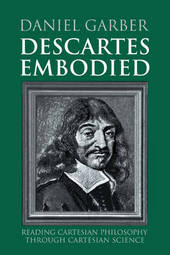
|
Descartes Embodied: Reading Cartesian Philosophy through Cartesian Science
Paperback / softback
Main Details
| Title |
Descartes Embodied: Reading Cartesian Philosophy through Cartesian Science
|
| Authors and Contributors |
By (author) Daniel Garber
|
| Physical Properties |
| Format:Paperback / softback | | Pages:352 | | Dimensions(mm): Height 226,Width 150 |
|
| Category/Genre | History of Western philosophy |
|---|
| ISBN/Barcode |
9780521789738
|
| Classifications | Dewey:194 |
|---|
| Audience | | Tertiary Education (US: College) | | Professional & Vocational | |
|---|
| Illustrations |
2 Tables, unspecified; 3 Halftones, unspecified
|
|
Publishing Details |
| Publisher |
Cambridge University Press
|
| Imprint |
Cambridge University Press
|
| Publication Date |
20 November 2000 |
| Publication Country |
United Kingdom
|
Description
This volume collects some of the seminal essays on Descartes by Daniel Garber, one of the pre-eminent scholars of early-modern philosophy. A central theme unifying the volume is the interconnection between Descartes' philosophical and scientific interests, and the extent to which these two sides of the Cartesian program illuminate each other, a question rarely treated in the existing literature. Amongst the specific topics discussed in the essays are Descartes' celebrated method, his demand for certainty in the sciences, his account of the relation of mind and body, and his conception of God's activity on the physical world. This collection will be a mandatory purchase for any serious student of or professional working in seventeenth-century philosophy, history of science, or history of ideas.
Reviews'This valuable collection of seminal papers, some heretofore not easily accessible, no doubt will enrich a wide audience especially students of and professionals engaged in early modern history of philosophy, ideas, or science. It enticingly shows the development of thought over time of one of the world's leading scholars of Descartes' system of philosophy.' The European Legacy 'One of the merits of these essays is that they engage with the full scope of Descartes's texts, and are sensitive to variations between Latin and French versions of the originals.' British Journal for the History of Philosophy
|